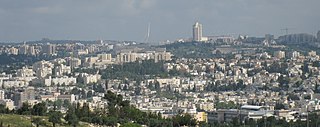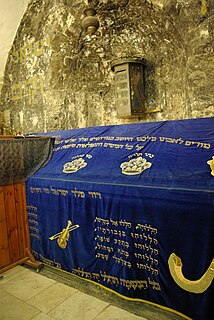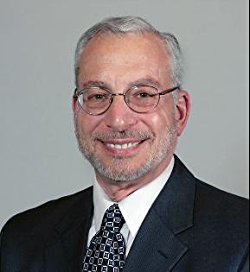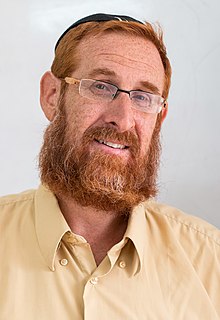
Jerusalem is a city in Western Asia. Situated on a plateau in the Judaean Mountains between the Mediterranean and the Dead Sea, it is one of the oldest cities in the world, and is considered holy for the three major Abrahamic religions: Judaism, Christianity, and Islam. The city straddles the Green Line between Israel and the West Bank; both Israelis and Palestinians claim Jerusalem as their capital. Israel controls the entire city and maintains its primary governmental institutions there while the Palestinian National Authority and Palestine Liberation Organization ultimately foresee it as the seat of power for the State of Palestine. Due to this long-running dispute, neither claim is widely recognized internationally.

Palestinian Christians are Christian citizens of the State of Palestine. In the wider definition of Palestinian Christians, including the Palestinian refugees, diaspora and people with full or partial Palestinian Christian ancestry this can be applied to an estimated 500,000 people worldwide as of 2000. Palestinian Christians belong to one of a number of Christian denominations, including Eastern Orthodoxy, Oriental Orthodoxy, Catholicism, Anglicanism, Lutheranism, other branches of Protestantism and others. Bernard Sabella of Bethlehem University estimates that 6% of the Palestinian population worldwide is Christian and that 56% of them live outside of the region of Palestine. In both the local dialect of Palestinian Arabic and in Classical Arabic or Modern Standard Arabic, Christians are called Nasrani or Masihi. Hebrew-speakers call them Notzri, which means Nazarene.

Shefa-Amr, also Shfar'am is an Arab city in the Northern District of Israel. In 2019 it had a population of 42,137, with a Sunni Muslim majority and large Christian Arab and Druze minorities.

During its long history, Jerusalem has been attacked 52 times, captured and recaptured 44 times, besieged 23 times, and destroyed twice. The oldest part of the city was settled in the 4th millennium BCE, making Jerusalem one of the oldest cities in the world.

Mount Zion is a hill in Jerusalem, located just outside the walls of the Old City. The term Mount Zion has been used in the Hebrew Bible first for the City of David and later for the Temple Mount, but its meaning has shifted and it is now used as the name of ancient Jerusalem's Western Hill. In a wider sense, the term is also used for the entire Land of Israel.

The Greek Orthodox Patriarchate of Jerusalem, also known as the Greek Orthodox Church of Jerusalem, and sometimes known as the Church of Zion, is an autocephalous church within the wider communion of Eastern Orthodox Christianity. Established in the mid-fifth century as one of the oldest patriarchates in Christendom, it is headquartered in the Church of the Holy Sepulchre in Jerusalem and led by the Patriarch of Jerusalem, currently Theophilos III. The Patriarchate's ecclesiastical jurisdiction includes roughly 200,000 to 500,000 Orthodox Christians across the "Holy Land" of Israel, Palestine, and Jordan.

The Catholic Church in Israel is part of the worldwide Catholic Church, in full communion with the Holy See in Rome.

David's Tomb is a site that, according to a late-medieval (9th-century) tradition, is associated with the burial of the biblical King David. Historians, archaeologists and Jewish religious authorities do not consider the site to be the actual resting place of King David. It occupies the ground floor of a former church, whose upper floor holds the Cenacle or "Upper Room" traditionally identified as the place of Jesus' Last Supper and the original meeting place of the early Christian community of Jerusalem.

The Van Leer Jerusalem Institute (VLJI) is a center for the interdisciplinary study and discussion of issues related to philosophy, society, culture, and education. The Institute was established in order to create a body of knowledge and discourse which gives expression to the wide range of disciplines and opinions in Israel. The contribution of a core of renowned scholars facilitates the implementation of reforms and new approaches in various social spheres.

Christianity in Israel is called Natsrut b'Yisrael in Modern Hebrew and al-Masihiat fi 'Isra'il in Arabic.
Freedom of religion is the freedom to practice religion, change one's religion, mix religions, or to be irreligious. Religion in the State of Palestine plays a pervasive role in society, including in the legal system and the educational system.

Holy See–Israel relations are the diplomatic relations between the Holy See and the State of Israel, as well as a concordat defining the status and fiscal and property rights of the Catholic Church and related entities within Israel. Formal diplomatic relations between the two states were established after the adoption of the Fundamental Agreement by the two States on 30 December 1993. A Vatican Nunciature in Israel and an Israeli embassy in Rome were simultaneously opened on 19 January 1994. From the Vatican's point of view, the establishment of diplomatic relations between the two states is part of the Christian–Jewish reconciliation; and from the Israeli point of view, the normalization of diplomatic relations. Prior to the establishment of diplomatic relations, the interests of the Catholic Church in Israel were looked after by the Apostolic Delegate to Jerusalem and Palestine, the Latin Patriarch of Jerusalem and the Custodian of the Holy Land, all of which continue to function.
Pave the Way Foundation (PTWF) headed by Gary Krupp is a non-sectarian organization whose mission is to identify and eliminate non-theological obstacles between religions. The organization is dedicated to achieving peace by addressing intolerance, furthering education, and practical relations between religions through cultural, technological, and intellectual exchanges. PTWF strives to eliminate the use of religion as a tool to justify conflict.

Rabbi Doctor Eugene B. Korn is a lecturer, scholar and educator. He lives in Jerusalem and was formerly Academic Director of the Center for Jewish-Christian Understanding and Cooperation (CJCUC) in Jerusalem. He was also co-director of its Institute for Theological Inquiry. Korn was the founding editor of Meorot: A Forum for Modern Orthodox Discourse, based at Yeshivat Chovevei Torah in New York City.

Where Heaven and Earth Meet: Jerusalem's Sacred Esplanade is a 2009 book about the esplanade in Jerusalem "known to Jews as the Temple Mount and to Muslims as al-Haram al-Sharif, or the Noble Sanctuary", edited by Oleg Grabar, the French art historian, archeologist and Harvard professor, and Benjamin Z. Kedar, the Israeli professor emeritus of history and vice-president of the Israel Academy of Sciences and Humanities at the Hebrew University of Jerusalem. It was published by the University of Texas Press in Austin, Texas.

Holy Basin, or Historic Basin is a modern Israeli term for a geographical area in Jerusalem that includes the Old City and its adjacent territories. The term was coined by the contemporary Israeli generation while a political-academic discourse on how does one refers to the area in Jerusalem where the historical and holy sites are concentrated. The term is being used in the field of geographical research and in contemporary geo-political studies specializing in urban planning, such as local master plans for Jerusalem and studies concerning the political future of the city.

The Center for Jewish–Christian Understanding and Cooperation or CJCUC is an educational institution at which Christians who tour Israel can study the Hebrew Bible with Orthodox rabbis and learn about the Hebraic roots of Christianity. The center was established in Efrat in 2008 by Rabbi Dr. Shlomo Riskin, who has been described as "the most prominent rabbinic spokesperson to Christian Zionists". CJCUC partners with major Christian interfaith organizations such as Christians United for Israel and the International Christian Embassy Jerusalem. Since Riskin's retirement as president of Ohr Torah Stone in 2018, the overseeing of all CJCUC activities has been turned over to David Nekrutman who has served as the center's chief director since its inception.

Yehudah Joshua Glick, alternatively spelled "Yehuda Glick", is an American-born Israeli Orthodox rabbi, activist, and politician. As the President of Shalom Jerusalem Foundation, he campaigns for expanding Jewish access to the Temple Mount. He was a member of the Knesset for Likud, having taken the place of former Defense Minister Moshe Ya'alon in May 2016 until April 2019.

City of David (Silwan) is the Wadi Hilweh area of the Palestinian Arab village of Silwan, intertwined with an Israeli settlement. The Silwan area of East Jerusalem was annexed by Israel following the 1967 Six-Day War and 1980 Jerusalem Law, an action not recognized internationally. The international community regards Israeli settlements as illegal under international law, although Israel disputes this.
















